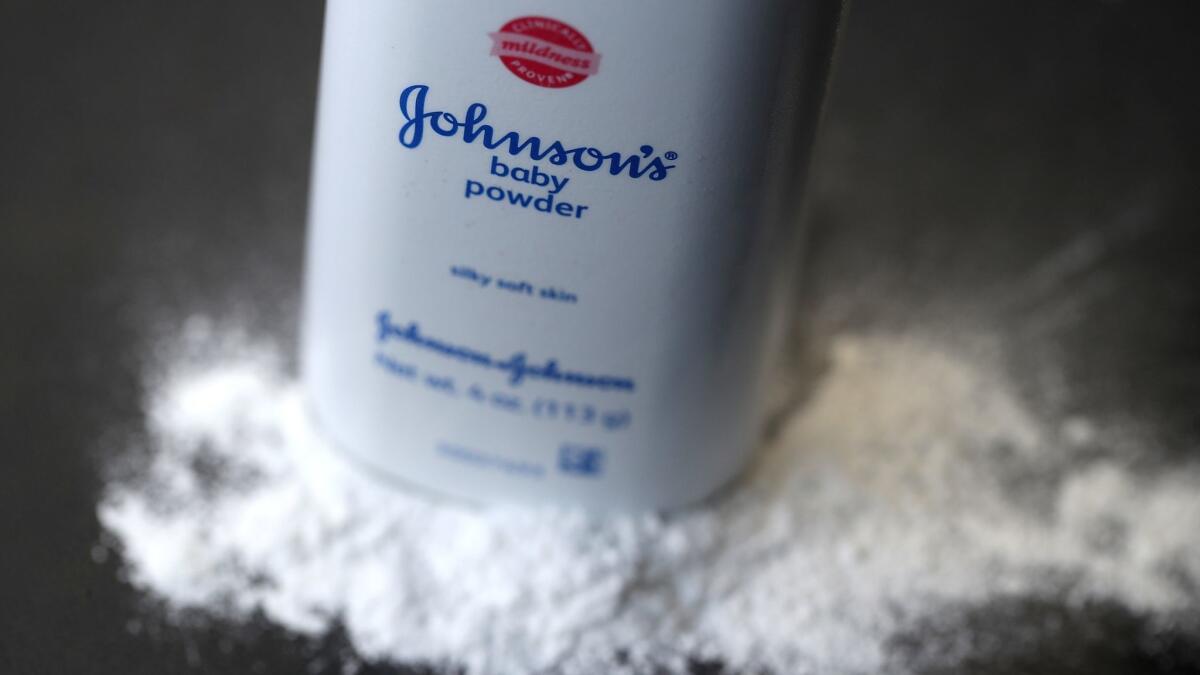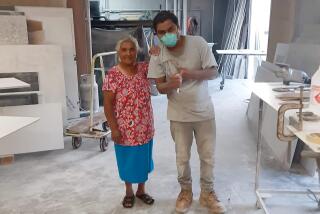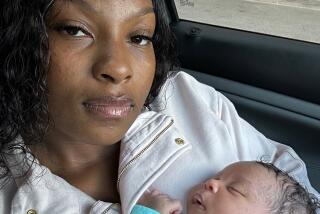Johnson & Johnson must pay $29 million to California woman who blamed baby powder for cancer

- Share via
Johnson & Johnson must pay about $29 million to a dying California woman who blamed asbestos-tainted talc for causing her cancer. The jury decision is the company’s latest loss in nationwide litigation over its iconic baby powder.
Jurors in state court in Oakland held J&J responsible Wednesday for Teresa Leavitt’s mesothelioma, a cancer linked to asbestos exposure. The panel, which included a lawyer and a state court judge, also found that the world’s largest maker of healthcare products didn’t warn Leavitt that its baby powder was tainted with the carcinogen.
The verdict was announced after the stock market closed. On Thursday, J&J shares fell 1% to $138.02. The stock has been under pressure over the last six months because of the growing talc litigation.
The verdict is J&J’s seventh trial loss over claims it hid the health risks of its baby powder for 50 years. It’s the first defeat since a Missouri jury ordered the company last year to pay $4.69 billion to 22 women who blamed their cancer on the product.
J&J officials contend Superior Court Judge Brad Seligman made errors in rulings on procedure and evidence in the latest trial that should have resulted in a mistrial.
“We are disappointed with today’s verdict and will pursue an appeal because Johnson’s Baby Powder does not contain asbestos or cause cancer,” Kim Montagnino, a J&J spokeswoman, said in an emailed statement. The company has had some talc-related verdicts thrown out and is appealing others.
Joseph Satterley, Leavitt’s lawyer, said “another jury has rejected the decades-long deception by Johnson & Johnson claiming that their baby powder was free of asbestos.”
“Hundreds of internal J&J documents showed the truth that it has been hiding for years. We are proud of the jury’s hard work and confident that jurors in future cases will likewise follow the science and the law,” he said.
J&J, which has steadfastly denied its baby powder is contaminated with asbestos, still faces more than 13,000 lawsuits claiming its 135-year-old baby powder line caused mesothelioma and ovarian cancer. That’s up from more than 11,000 as of last year. It has more than two dozen trials scheduled around the United States this year.
The Oakland jury of five men and seven women ordered J&J to pay $29 million in actual damages for Leavitt’s injuries after finding that the company’s handling of the asbestos-laced baby powder was a “substantial contributing factor” in her cancer’s development. The panel also cited J&J for “failing to adequately warn” about the powder’s “potential risks.”
The panel found J&J responsible for 78% of Leavitt’s award and its consumer products unit is on the hook for 20%. Cypress Mines, one of J&J’s former talc suppliers, is answerable for the remaining 2%.
Imerys Talc America Inc., which also supplied talc for J&J’s powder, had been named as a defendant, but was dropped from the case after seeking bankruptcy protection to avoid being swamped with talc suits. It’s a unit of Paris-based Imerys.
Leavitt’s doctors say her mesothelioma is advanced and she is not expected to live beyond 2020, according to testimony in the case. The mother of two testified that baby powder was used on her when she was a child, and she continued that practice into adulthood, sometimes as a “dry shower” and as foundation for her makeup.
Her lawyers noted that internal J&J documents indicated officials knew since the 1970s that baby powder mined in places such as Vermont and Italy contained trace amounts of asbestos, but failed to alert consumers or regulators. Asbestos is often found intertwined with talc.
Even though Leavitt stopped using baby powder two decades ago, recent tests of her lung tissue showed evidence of asbestos, an expert witness testifying for the plaintiff told jurors at one point in the trial. He said the specific type of asbestos wasn’t industrial grade; if it had been, that would have indicated she was exposed to it on the job.
J&J’s attorneys countered that there was no credible evidence the company’s baby powder caused her mesothelioma and that evidence of talc in her tissue could have come from a myriad of sources.
The company has long argued that multiple studies have shown the powder to be free of the carcinogen and that plaintiffs’ cancers were tied to asbestos exposures at work or though building materials in homes or offices.
J&J has refused to put a warning on its bottles of the powder, even though a separate California jury last year asked a judge to order it to do so. After the judge refused, that panel ordered J&J to pay a total of $27.5 million in damages to a woman who sued the company over her cancer.
One juror said after Wednesday’s verdict that she probably won’t buy any more J&J baby powder.
“They knew there was asbestos in it, and for me that’s the worst part because they failed to warn the consumer,” said Kate Alessandri, an Oakland librarian.
Another juror, Anu Agarwal, a product manager in Castro Valley, said J&J was irresponsible for failing to adequately follow up on studies that showed the presence of asbestos in its baby powder. But she added that she didn’t think Leavitt’s lawyers proved that her cancer was the result of exposure to talc.
“I don’t think they made a good case” that J&J’s Baby Powder “contained a significant enough amount of asbestos contamination to cause the illness,” she said.
More to Read
Inside the business of entertainment
The Wide Shot brings you news, analysis and insights on everything from streaming wars to production — and what it all means for the future.
You may occasionally receive promotional content from the Los Angeles Times.










